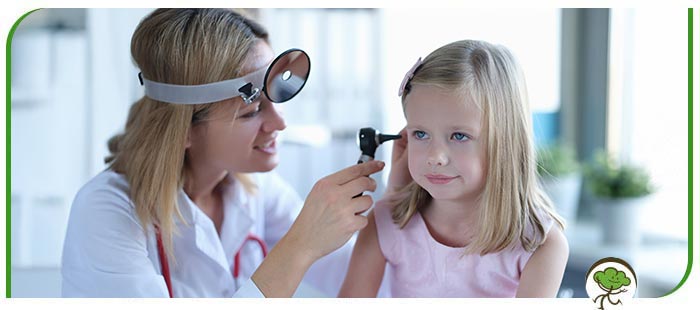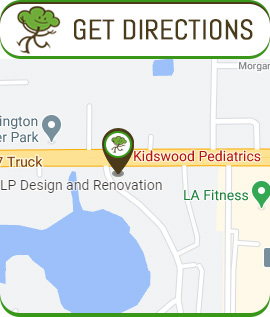What to Expect During Your Child’s Hearing Screening?
A hearing screening is a quick and painless evaluation designed to detect hearing loss in children at an early stage. Early detection of hearing issues is crucial for speech and language development, as untreated hearing loss can impact learning and social skills. At Kidswood Pediatrics, Dr. Zully Ambroise, M.D., performs comprehensive hearing screenings to support your child’s developmental needs. If your child is scheduled for a hearing screening, our team will guide you through the process and address any concerns. For more information, contact us or schedule an appointment online. We are located at 1680 Lee Rd, Winter Park, FL 32789.


Table of Contents:
What happens during a pediatric hearing screening?
How is a hearing screening performed on young children?
What age should my child have their first hearing screening?
Will I need to do anything to prepare my child for a hearing screening?
A pediatric hearing screening is a quick and painless test designed to assess a child’s ability to hear different sounds. Early detection of hearing issues is crucial, as hearing plays a vital role in speech, language, and overall developmental milestones. These screenings are commonly performed during newborn checkups, routine pediatric visits, and before starting school. If any concerns arise during a hearing screening, further diagnostic testing may be recommended to confirm any hearing loss and determine the best course of action.
Hearing screenings vary depending on a child’s age and developmental stage. For infants and young children, objective tests measure the ear’s response to sound without requiring active participation. Older children, however, may undergo interactive tests that assess their ability to detect and respond to different sound frequencies. Regardless of the method, the goal is to identify any potential hearing issues as early as possible to ensure appropriate intervention and support.
What to Expect After the Screening:
• If the results indicate normal hearing, no further action is needed.
• If potential hearing loss is detected, additional tests may be recommended for a more comprehensive evaluation.
• If a child has difficulty hearing, early intervention strategies, such as speech therapy or hearing aids, may be discussed with parents and caregivers.
Pediatric hearing screenings are an essential part of a child’s overall health care, ensuring that any hearing impairments are detected and addressed early. Regular screenings help support speech development, learning, and social interaction, ultimately improving a child’s quality of life.
Hearing screenings for young children are designed to be simple, painless, and non-invasive, ensuring a comfortable experience. The process typically begins with a visual examination of the ears using an otoscope. This allows healthcare professionals to check for any blockages, such as earwax buildup or signs of infection, which could impact hearing. Identifying these issues early helps ensure accurate test results and proper follow-up care if needed.
To assess hearing function more precisely, objective tests like the Otoacoustic Emissions (OAE) test may be used. This involves placing a small probe in the ear canal that emits soft sounds and measures the echoes that return from the cochlea, indicating whether the inner ear is functioning properly. For infants or young children who cannot actively participate in standard hearing tests, the Auditory Brainstem Response (ABR) test may be performed. This test involves attaching small electrodes to the child’s head to measure brainwave activity in response to sounds, ensuring that the auditory nerve is transmitting signals correctly.
For older children who can engage with sound-based assessments, Behavioral Audiometry Evaluations may be conducted. This method involves presenting sounds of varying volumes and pitches and observing the child’s responses. The child may be asked to perform specific tasks, such as raising a hand or turning their head toward the sound source. These evaluations provide a more interactive approach to assessing hearing abilities. If any hearing concerns are detected, further diagnostic testing and appropriate interventions can be explored to support the child’s auditory development.
It’s crucial for your child to have their first hearing screening shortly after birth. In many cases, newborn hearing screenings are performed before discharge from the hospital. However, if your child was born outside of a hospital setting or missed the initial screening, we recommend scheduling a hearing test with us within the first month. Early detection of hearing impairments is vital, as it allows for timely interventions that can significantly enhance your child’s communication skills and overall development.
Even if the initial hearing screening does not reveal any issues, regular assessments are essential. We offer ongoing hearing evaluations during well-child visits, especially in the early years and periodically throughout the school years. This proactive approach ensures that any changes in hearing ability are promptly identified and addressed, safeguarding your child’s learning and interaction with the world.
We encourage parents to be vigilant for any signs of hearing difficulties, such as a lack of response to sounds, delayed speech development, or frequent ear infections. If you have any concerns, our dedicated team is here to help. We prioritize early and regular screenings as a fundamental part of your child’s health and development strategy, ensuring they have the best opportunities for growth and success.
At Kidswood Pediatrics, we understand the importance of ensuring your child’s hearing health and preparing for a hearing screening can be a smooth process with a few simple steps.
• Explain the Process: Start by explaining to your child what a hearing screening is and why it’s important. Describe it as a simple test that helps check how well they can hear different sounds, which is essential for listening, learning, and communicating.
• Day of the Screening: On the day of the hearing screening, ensure your child is well-rested and has had a light meal. Fatigue and hunger can affect their mood and attention, which may influence their ability to cooperate during the test. Dressing them in comfortable clothing can also help them feel at ease throughout the process.
• Bring Necessary Documentation: If your child has had previous hearing screenings or any related medical evaluations, bring along any necessary documentation or medical records. If they use hearing aids or other assistive devices, make sure they are wearing them or have them available for the appointment.
• Communicate Any Concerns: If you have noticed any changes in your child’s hearing, such as difficulty responding to sounds, speech delays, or frequent ear infections, discuss these observations with the healthcare provider. Sharing these details can help ensure a thorough assessment and guide any necessary follow-up care or interventions.
By following these steps, you can help ensure that your child’s hearing screening at Kidswood Pediatrics is a positive and effective experience. Our team is committed to providing compassionate and comprehensive care for your child’s health needs. For more information, contact us or schedule an appointment online. We are located at 1680 Lee Rd, Winter Park, FL 32789. We serve patients from Winter Park FL, Goldenrod FL, Lockhart FL, Maitland FL, Apopka FL, Casselberry FL, Oviedo, FL, and surrounding areas.

Additional Services You May Need
▸ Covid Test
▸ Vaccinations
▸ Well and Sick Visits
▸ Newborn Care
▸ Preterm
▸ Sports Physicals
▸ ADHD Screening
▸ Well Child Care
▸ Flu Vaccination

Additional Services You May Need
▸ Covid Test
▸ Vaccinations
▸ Well and Sick Visits
▸ Newborn Care
▸ Preterm
▸ Sports Physicals
▸ ADHD Screening
▸ Well Child Care
▸ Flu Vaccination


